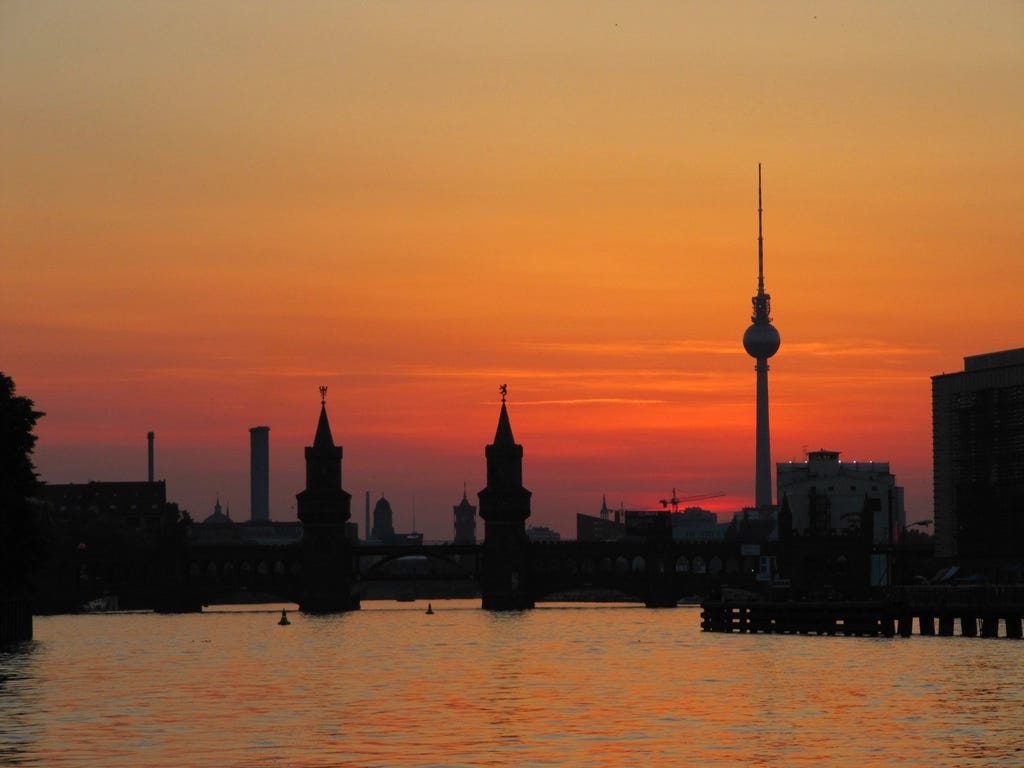#348: My top 3 for 2024
What's new in 2025
Dear 20 Percent,
It’s New Year’s Eve. I’m feeling a little lethargic so I’ll keep this shorter than usual. Later today, Andrew and I are going to record Episode 3 of the 20 Percent Berlin Podcast. So please watch this space.
Zwischen den Jahren (“between the years”), it’s customary to look back at the past year, so here are my top three local stories for 2024:
Digitalisation, sort of. Amazingly, Berlin managed to make some e-goverment progress in ‘24, which will hopefully lead to a much-needed administrative efficiency boost. For example, Anmeldung (registration) is now available online. Caveats: it’s only possible with a German or European e-ID; only possible for moves within Berlin or from somewhere else in Germany.
Budget cuts. The city-state’s CDU-SPD government slashed spending in 2025 by 10%, with transport and culture hit hardest. No more €29/month local public transport — although people who purchased the €29 ticket in 2024 will get a free, automatic upgrade to the Deutschlandticket. The upgrade will last 1 year from the date of purchase. The Deutschlandticket (valid for all local and regional public transport in Germany) now costs €58/month. Culture funding also took a massive across-the-board hit, prompting protests by people and institutions. Critics of the cuts pointed out that the city’s vibrant culture scene is what makes this an attractive city to live, work and invest.
Turbo-charged citizenship office. Partially thanks to an all-digital process, the new, centralized Einbürgerungsbehörde managed to naturalise 21,000 people since its launch last January, overshooting its target by 1,000. The agency’s 2025 target is 40,000 new Germans. Go Berlin. It’s good to see that the state understands that citizenship means more integrated, less frustrated and happier people, who can finally enjoy voting rights in a country where they’ve been paying taxes for years or decades. Meanwhile, my comrade-in-arms Andrew is struggling with his citizenship application because he overslept an appointment.
If you’re reading this on NYE, stay safe tonight. If it’s already 2025, we wish you all the best in the new year — and we hope we’ll be part of your life for the next 12 months!
Not a hell of a lot of news the past few days. Instead, below I’m posting what’s new in 2025.
Guten Rutsch!
Maurice (& Andrew)
2025: New rules, benefits, charges 😭
The minimum hourly wage goes up by 41 cents to €12.82
Kindergeld (child benefit) goes up by €5 to €255/month per kid.
The Krankenkassen (statutory health insurance funds) can decide how much above the base rate of 14.6% (split between employers and employees) they can charge. This additional contribution (called the Zusatzbeitrag) can now amount to another 2.5 percentage points above the base rate. If your Krankenkasse raises its rates in January, you have until the end of the month to cancel your contract if you feel like switching to a cheaper one. tl;dr health insurance going up again.
The contribution for elder care is going up by 0.2 percentage points.
Housing benefit (Wohnhgeld) up by €30/month.
Electricity charges (that pay for the development of renewables) up by 1.3 cents per kWh to a total of 3.15 cents per kWh. For households consuming 3,000 kWh/year, annual cost rises by about €40. A single-person household can expect to pay €20 more. Natural gas fees also going up.
sponsored
🇩🇪 New year, new resolve to learn German! If you’re really serious about it, check out SmarterGerman, a Berlin-based online German school created by local language teacher Michael Schmitz. Free trial, loads of discounts available. Sign up here. 🇩🇪
The price of standard domestic snail mail letters goes up from 85 to 95 cents.
Unified USB-C charging cables for all smart phones and tablets
Finally, it’s now verboten to throw textiles into the regular trash, thanks to an EU regulation. Unwanted clothes need to be thrown into one of those overflowing collection containers or brought to a BSR recycling centre.
Source: Verbrauchenzentrale
Germany-wide news
🐌 Will Germany release the debt brake in 2025?
📣Elon Musk promotes the AfD in German newspaper
🚘Massive electric car data leak at Volkswagen
🏫Germany supports school projects in Syria
Factoid

2024 was the warmest year on record for Berlin since temperetures were first recorded 116 years ago, Tagesspiegel reports. The average temperature measured at a weather station in Dahlem was 11.8°C. The hottest day was August 29, with a high of 34.1°C. There were 2,000 hours of sunshine, slighter higher than average. Last January saw 4cm of snow, which stuck around for about a week, far less than the average of the last three decades.



Dahlem had it cool. There was at least one but maybe 2 days of 37C high here in Tegel in late August - early September.
Also the maximum and minimum health insurance contributions go up which probably would be more noticeable than the additional percentage. I personally don’t know anyone who would pay a value that is not either min or max: it’s either a broke Kunstler/Yoga instructor or a foreigner who had to qualify for Blaue Karte EU to work here. But according to my estimations, the change in tax brackets will compensate for this and even give a few euros over. But the information available is very vague so I’m probably wrong.